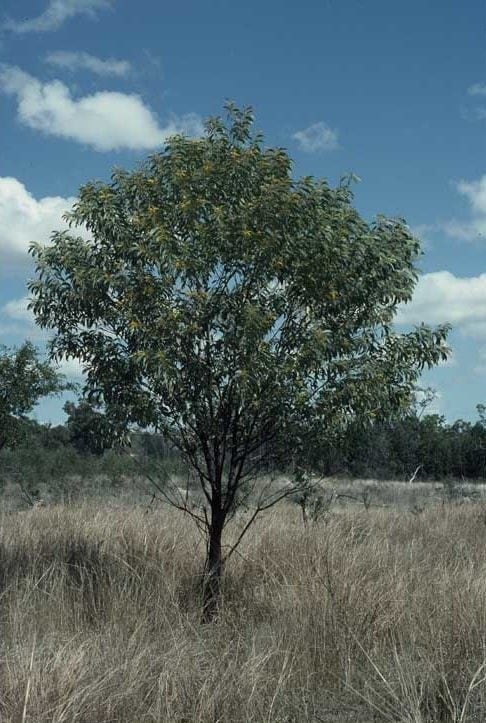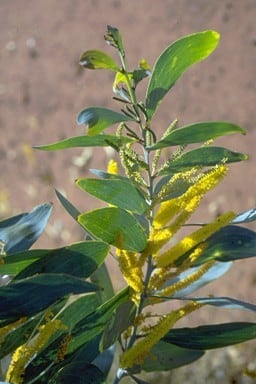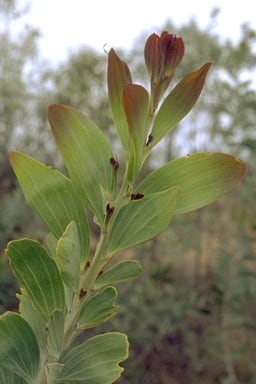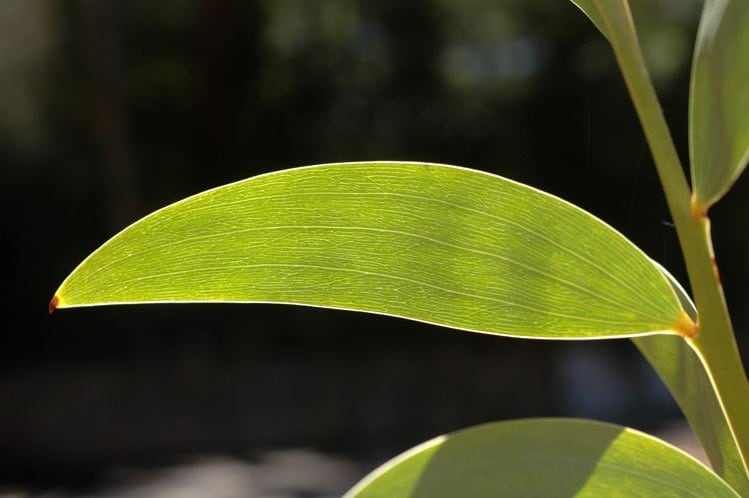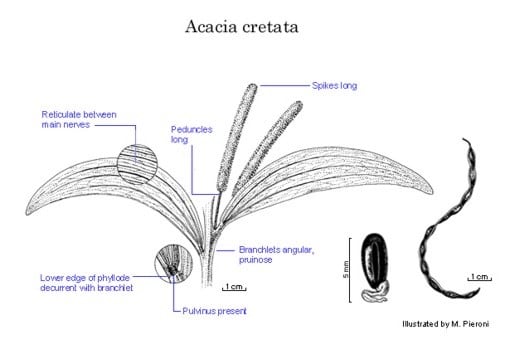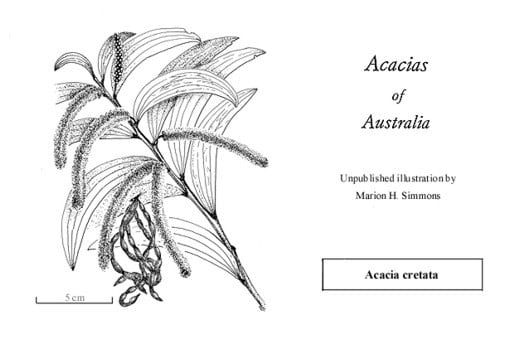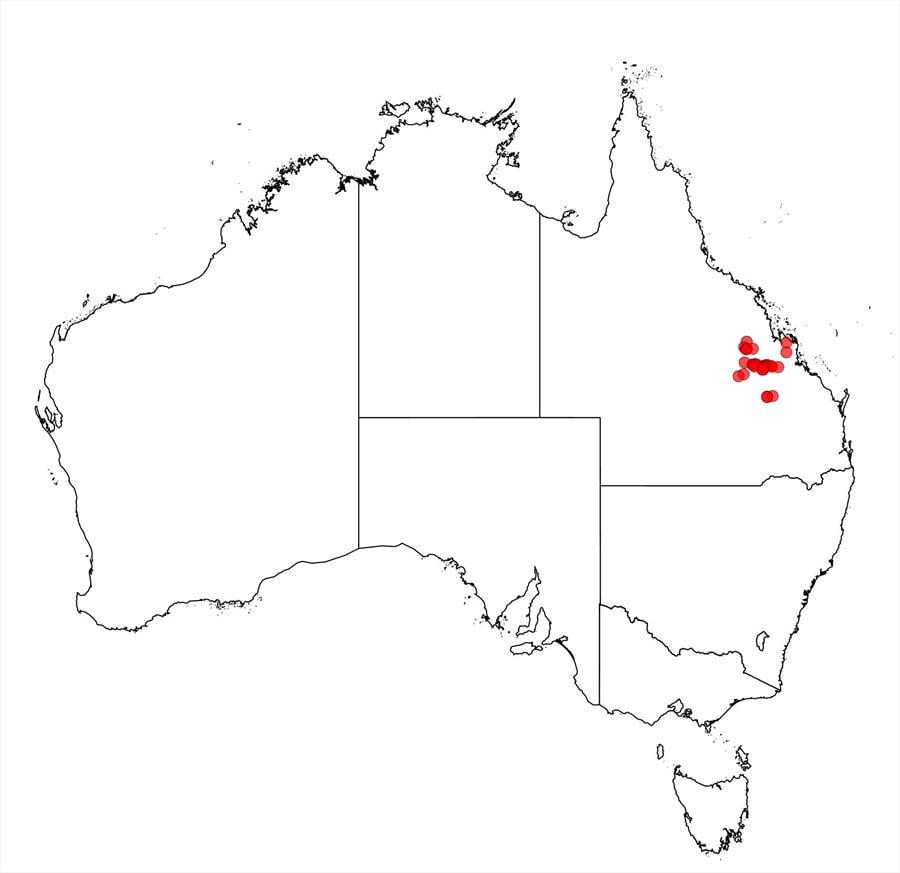Acacia cretata Pedley
WATTLE
Acacias of Australia
Family
Fabaceae
Distribution
Occurs in Qld along the Great Dividing Ra. between Mara and Moranbah, common on Blackdown Tableland.
Description
Shrub or tree to 8 m high, single-stemmed, round-topped. Bark smooth, later rough and fibrous, grey-brown. Branchlets markedly angular, flattened, stout, brownish crimson, normally pruinose, glabrous. Phyllodes obliquely narrowly elliptic to elliptic, narrowed abruptly into broad pulvinus, lower edge of phyllode sometimes continuous with branchlet, normally shallowly to obviously falcate but sometimes straight-dimidiate, 7–14 cm long, (12–) 17–40 mm wide, with hooked apex, coriaceous, silvery grey-blue to glaucous, glabrous, with 2 or 3 prominent main nerves free to base or lower two contiguous but remaining free from lower margin; minor nerves sub-distant (2–4 per mm, longitudinally anastomosing; gland 1, basal, to 1 mm above pulvinus. Spikes 4–12 cm long, bright yellow, flowers sub-dense to widely spaced; peduncles 7–25 mm long. Flowers 5-merous; calyx 0.4–0.6 mm long, dissected to 1/4, glabrous; corolla 1.2–1.5 mm long, dissected to 1/2, glabrous; ovary glabrous or pubescent. Pods linear, raised over and ±constricted between seeds, 6–10 cm long, 3–5 mm wide, thinly crustaceous, glabrous, ±resinous. Seeds longitudinal, oblong-elliptic, 4–6 mm long, 1.8–2 mm wide, black; aril yellow.
Phenology
Flowers July–Sept.
Habitat
Grows in eucalypt open forest, in sandy, gravelly or loamy soils, usually over sandstone.
Specimens
Qld: 18 miles [28.8 km] NE of Capella T/S [Township], L.Adams 1293 (CANB, NSW); 16.8 km E of Comet railway stn, N.Hall 78/60 &78/61 (NSW); 9 miles [14.4 km] E of Comet Township, M.Lazarides & R.Story 67 (CANB, NSW); Blackdown Tableland, J.G.Simmons & M.H.Simmons 2694 (NSW).
Notes
Acacia cretata has previously been included with a complex of taxa under the name ‘A. cunninghamii’ (see A. concurrens for discussion), but can be distinguished from similar species by its normally pruinose branches, the glaucous phyllodes contracted abruptly into a short pulvinus and the glabrous flowers, fide L.Pedley, Contrib. Queensland Herb. 4: 1 (1969) and Austrobaileya 1: 164 (1978). As noted by L.Pedley, Austrobaileya 5: 318 (1999) there is variation in this species with plants from lower altitudes on the northern edge of the Blackdown Tableland having more slender branchlets, somewhat smaller phyllodes tapering to longer pulvinuses and shorter inflorescences than those from higher altitudes on the Tableland. Intergrades with A. fodinalis in the Emerald–Blackwater–Duaringa area, fide L.Pedley, Austrobaileya 5: 318 (1999).
FOA Reference
Data derived from Flora of Australia Volumes 11A (2001), 11B (2001) and 12 (1998), products of ABRS, ©Commonwealth of Australia
Author
Edited by B.R.Maslin
Dr M.D.Tindale and Dr P.G.Kodela with the assistance of M.Bedward, S.J.Davies, C.Herscovitch, D.A.Keith and/or D.A.Morrison
This identification key and fact sheets are available as a mobile application:
URL: https://apps.lucidcentral.org/wattle/
© Copyright 2018. All rights reserved.
